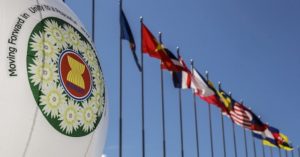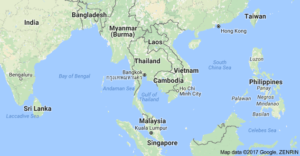Yangon: Asean- Looking for ASEAN in Laos
Conversations with Lao people also reveal a sentiment that Laos, a Least Developed Country of about 7 million people, still needs a good amount of effort to catch up with the other countries in ASEAN.
Laos became an ASEAN member in 1997 as one of the so-called CLMV countries, which also include Cambodia, Myanmar and Vietnam. The group’s other members − Brunei, Indonesia, Malaysia, the Philippines, Singapore and Thailand – are known as the ASEAN Six.
Anongkone Phimmasone, whose work with a high-profile Japanese construction company called Satokogyo has seen him being sent to Thailand, Singapore and Malaysia, has a regional mindset not commonly found in Vientiane. After working in South East Asia for more than five years, the 36-year-old civil engineer says he believes that Laos needs to improve its working environment, systems and human resources if it is to better use its links with the rest of ASEAN and its 640 million people.
“Laos is still behind other countries. We lack a good system. For example, we don’t even have a professional license for engineers. Everyone in Laos can practise engineering so it is hard to control standards,” said Anongkone, explaining how a graduate certificate is different from a professional license. “In Singapore, Malaysia and Thailand, you must pass a test that examines your knowledge about materials, law, and safety to get the license.”
At the same time, he believes that Laos – usually described as a landlocked country that is banking on regional integration to achieve its development goals – has a lot of resources. Its membership in ASEAN has given it a place of its own in the region. “Laos is in an advantageous position. It still has rich natural resources and is strongly supported by its brother China,” said Anongkone. “People outside Laos see our country as more legitimate and not alone anymore because Laos is part of the ASEAN Community. These factors can attract more investors. As long as Laos has transparent regulations and a clear and supportive investment policy, it can benefit from this membership.”
Sittiphone Thapesuphanh, 37, who runs his own human resource consultancy here called Karuna Sole Company, appreciates the cooperation among ASEAN members. “We have learnt and continue learning from other nations who have gone through the same struggles we are facing now,” he added. “We have other members as our allies, providing assistance on issues ranging from basic infrastructure to education, public health and economic development.”
Having provided human resource personnel and career planning for students, Sittiphone said the country can gain opportunities from easier movement of professionals in the region, which the ASEAN Economic Community is supposed to facilitate.
“Since we lack a lot of skills, knowledge, know-how and such, we can now get access (to these) as part of a larger labour market for short-term benefits. However, for longer-term benefits, we will learn and improve ourselves to match our neighbours, not only in terms of knowledge and skills, but also in attitude, especially professionalism, which we still lack,” Sittiphone said.
ASEAN’s expansion has taken into account the different levels of development between the ASEAN Six and the CLMV countries, which have until 2018 to put in place arrangements for the ASEAN Community, especially the ASEAN Economic Community. ASEAN also has a programme for narrowing the development gap between newer and older members, as part of efforts to avoid having a two-tiered association.
Both Sittiphone and Anongkone, who has established his own construction company, can sense that the business and labour sectors are going to face more trade liberalisation and competition from stronger ASEAN economies.
“Other ASEAN countries have much more advanced technology and skills in construction. They have built high-rise buildings for ages, while we have just started. This competition will have negative effects on labour, but in a way, we can learn a lot from them,” Anongkone said.
Ketdala Chanthaboupha, a mother of three who is married to an Australian national, once studied in Vietnam and now lives in Jakarta, Indonesia. Against this backdrop, Ketdala reflects that Laos can benefit from learning from its neighbours – including changing people’s attitudes toward job values.
For her, Laos people often prefer to do ‘easier’ jobs compared to their neighbours in Vietnam and Indonesia. For instance, she said, “I really admire Indonesians who work as road traffic instructors. Despite the rain or heat, they still work with very little income. I wish Laos people to have this attitude (too),” Ketdala said.
With its peaceful environment, Laos has the potential to attract investors and tourists, Ketdala says. To provide employment opportunities for local people, especially women, Laos could perhaps learn from Indonesia, she adds.
“Supplying professional and well-trained housemaids to foreigners or sending housemaids to other countries is a good business in Indonesia,” she said, adding that this could perhaps help Laos reduce its citizens’ vulnerability to human trafficking and undocumented migration, as well as unemployment.
After two decades, Laos cannot turn back the clock and focus on the problems and challenges of regional integration, but needs to seriously work on improving its infrastructure, labour skills, and support for business and foreign investment. In sum, Laos has to learn, understand and adjust to the changing environment in the region.
“Why do we need to keep up with the rest? The answer is clear. If we don’t, we will lose our jobs to the better candidates who are from other countries,” Sittiphone said. “Of course, we will also have disadvantages from the freer movement of labour within the region. However, this will only be short-term and, after the adjustment, I believe that Laos will enjoy an improvement in our labour quality.”
– Reporting ASEAN
Courtesy: The Myanmar Times | 19 OCT 2017
>


<>
NOTE : All photographs, news, editorials, opinions, information, data, others have been taken from the Internet ..aseanews.net | [email protected] |
For comments, Email to :
Aseanews.Net | [email protected] | Contributor









